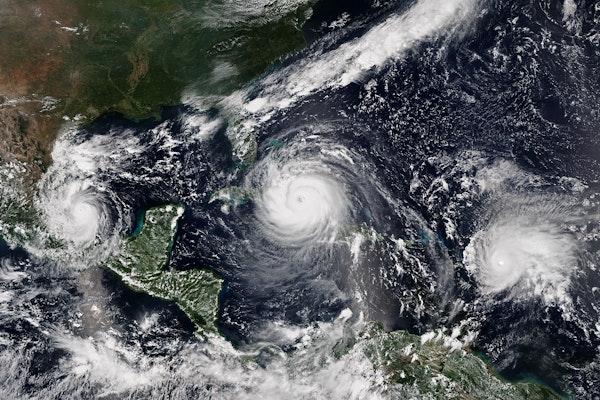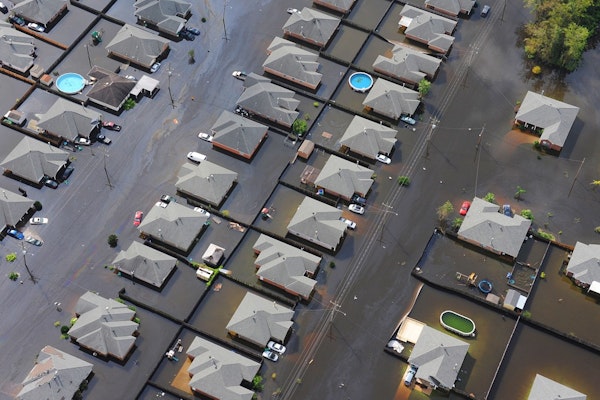
Watchdog Highlights EPA’s Ongoing Cybersecurity Issues
The Government Accountability Office has warned that the Environmental Protection Agency has yet to implement a comprehensive cybersecurity risk assessment process, a recommendation first made in 2019.
May 28, 2024
Legislation & Regulation
Life & Health
Risk Management
Technology

NTSB Recommends Urgent Bridge Inspections Across the U.S.
The National Transportation Safety Board has urged federal and state authorities to review inspection reports and address maintenance issues for bridges made of uncoated weathering steel, following the 2022 Fern Hollow Bridge collapse in Pittsburgh.
May 28, 2024
Legislation & Regulation
Liability
Risk Management
Technology
Pennsylvania

Texas Hit by Severe Storms, Leaving Over 750,000 Without Power
Powerful storms swept through Texas on Tuesday, causing over 750,000 power outages and significant damage, especially in the Dallas-Fort Worth area, with further severe weather expected throughout the day.
May 28, 2024
Catastrophe
Property
Risk Management
Technology
Florida
Louisiana
Oklahoma
Texas

How AI Jim is Revolutionizing Claims Processing at Lemonade
Discover how Lemonade’s AI Jim is transforming the insurance claims process with unprecedented speed and accuracy.
May 24, 2024
Fraud
Insurance Industry
Risk Management
Technology

Cargo Theft Expected to Increase Over Memorial Day Weekend
Prepare for a spike in cargo thefts this Memorial Day weekend with these essential tips from CargoNet.
May 24, 2024
Fraud
Property
Risk Management
Technology
California
Florida
Georgia
Texas

NOAA Expects Busy 2024 Atlantic Hurricane Season
NOAA forecasts an above-normal 2024 Atlantic hurricane season driven by La Nina and warm ocean temperatures, with an 85% chance of higher than average storm activity.
May 23, 2024
Catastrophe
Insurance Industry
Risk Management
Technology

VR Solution Revolutionizes Workers’ Compensation Pain Management
A new VR-based program offers non-pharmacological treatment for chronic lower back pain in workers’ compensation cases, promising cost-effective and safe pain relief.
May 23, 2024
Life & Health
Risk Management
Technology
Workers' Compensation

Building Resilience with Insurance
The Global Sustainability Insurance Summit in Los Angeles highlighted how insurance plays a pivotal role in enhancing resilience against natural catastrophes.
May 22, 2024
Catastrophe
Insurance Industry
Risk Management
Technology
California
Hawaii
New York

Leveraging AI for Plain Language in Life Insurance Communications
Regulatory demands for plain language drive life insurers to adopt generative AI tools to improve customer communications and ensure clarity and compliance.
May 22, 2024
Insurance Industry
Legislation & Regulation
Life & Health
Technology

Gina Raimondo Unveils Strategic Vision for AI Safety and Global Cooperation
U.S. Commerce Secretary Gina Raimondo announces strategic vision for AI safety and plans for a global network of AI Safety Institutes, emphasizing international cooperation to mitigate AI risks.
May 22, 2024
Legislation & Regulation
Risk Management
Technology
California

Diverse Data Sources Revolutionize Flood Insurance Underwriting
Leveraging diverse data sources and advanced computing power is transforming flood insurance, making it a viable option for private insurers and improving coverage accuracy and affordability.
May 22, 2024
Insurance Industry
Property
Risk Management
Technology

Florida’s Hurricanes: Lessons Learned and Advances in Insurance Technology
In the two decades since Florida’s devastating 2004 hurricane season, insurers have significantly improved their response strategies and technology, enhancing preparedness and resilience against future storms.
May 22, 2024
Catastrophe
Property
Risk Management
Technology
Florida

Can Generative AI Teach the Next Generation of Underwriters?
Industry experts discuss how generative AI can address challenges in training and retaining underwriters amid shifting expectations and rapid digital changes.
May 21, 2024
Education & Training
Insurance Industry
Risk Management
Technology

Arctic Wolf Predicts Surge in Cyber Threats for 2024
Arctic Wolf’s 2024 Threat Report reveals a 20% increase in ransom demands and a rise in ransomware attacks, highlighting the need for stronger cybersecurity measures.
May 21, 2024
Fraud
Insurance Industry
Risk Management
Technology

How Climate Change Will Transform Healthcare Delivery and Payer Strategies
Climate change is set to significantly affect healthcare delivery, increasing utilization and costs while disrupting supply chains. Payers must develop comprehensive strategies to address these challenges and ensure sustainable operations.
May 20, 2024
Life & Health
Property
Risk Management
Technology
California
North Carolina





